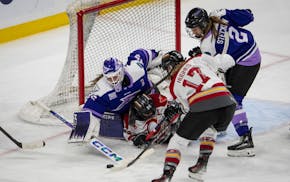Tyler Nubin had just picked off a Luke Altmyer pass with just over four minutes remaining in the Gophers' tussle with Illinois. Minnesota had the ball at their 39-yard line and appeared to have the game in the bag.
Two runs netted a total of 6 yards. Illinois called timeout with 183 seconds left to play. On third-and-4, the Gophers elected not to run the ball. Athan Kaliakmanis dropped back and looked for tight end Nick Kallerup, but his pass fell incomplete. The clock stopped with less than 3 minutes remaining.
No problem. Just punt away and make Illinois go 80-something yards to beat them. Altmyer got walloped during the next series, so backup John Paddock was in anyway. Surely the Gophers couldn't let this one slip away. Surely, the decision to throw a pass and not get the clock moving with a run on third down would not lead to immediate regret. Illinois' offense had done little in the second half, except when Kaden Feagin took a swing pass 54 yards for a score — thanks to some poor angles by pursuing Gophers defenders.
So stuff the Illini, go to 6-3 and control your own destiny in the Big Ten west following losses by Wisconsin and Nebraska on Saturday.
Wait. What?
Paddock came in slinging on fourth-and-11, completing a 22-yard pass then another for 17. Well, just keep everyone in front of you as the clock runs out.
That didn't happen.
The Huntington Bank Stadium crowd then let out a collective gasp as Isaiah Williams, somehow, got behind the Gophers defense and hauled in a 46-yard touchdown pass to give the Illini a 27-26 lead with 50 seconds to play.
No way.
And four plays later, the Gophers turned the ball over on downs to the Illini, who went into victory formation.
A hard-fought victory and a three-game winning streak turned into classic second-guessing. The Gophers left some plays out on the field, for sure. And coach P.J. Fleck left some decisions on the field, too.
Regrets? Fleck should have a few after Saturday. Beginning with the third-down pass in the fourth quarter. At least he should have forced Illinois to decide whether or not to use its final timeout.
"That starts with me 100 percent," Fleck said. "We weren't able to get it done. We decided to go with a little pop pass, which was open. We just have to get a little touch on it. You know [it was] to go win the game. You do that and you are close to down time."
There were others. The Gophers had the ball on the Illinois 18-yard line on fourth-and-5 near the end of the second quarter. Fleck took the conservative route for most of the drive, with the final six plays being runs — despite Kaliakmanis already 9-for-11 with two touchdown tosses. Illinois was set to receive the second-half kickoff, so Fleck took the sure three points with his reliable kicker Dragan Kesich.
Based on the flow of the game, a 17-14 lead did not seem like enough. And it wasn't. Kaliakmanis had the hot hand, but Fleck felt the Illini defense was vulnerable to the run and stuck with it.
When Altmyer coughed up the ball during the opening series of the third quarter, the Gophers had the ball at the Illinois 12. Corey Crooms Jr. dropped a pass in the end zone under tight coverage. But the Gophers ran the ball for 3 yards on the next play, making it third-and-long. Kaliakmanis was sacked on the next play by Jer'Zhan Newton, one of college football's great disrupters, who had to serve a suspension during the first half. He immediately had an impact on the game. And that's another reason to not settle for a field goal at the end of the second quarter. Newton was going to boost the Illini defense.
That was a point of the game where the Gophers could have been more aggressive and put more than six points on the board. Later, there was a point where he should have run the ball. Add poor execution at the wrong times, and it was a victory that slipped away.
(And Illinois coach Bret Bielema is now 10-0 all-time against the Gophers.)
"I thought we played really clean football for a long time," Fleck said. "But then there's some catastrophic things that happen."
Yes, it was quite a last-minute collapse.

Neal: Frost's PWHL title serves as a sweet topping to an outstanding final series

Neal: Frost goaltender Maddie Rooney stands tall — and stands up for her teammates on defense

Neal: Another season begins at Canterbury Park with Minnesota's sports betting future in limbo


